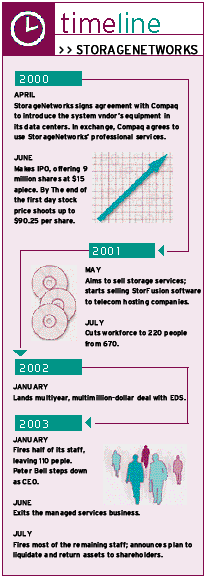Storage Player To Liquidate
The Waltham, Mass.-based company has laid off all of its employees except for a small transitional team charged with overseeing the winding down of the business. StorageNetworks also filed a proxy statement seeking shareholder approval of its plans for liquidation.

Paul Flanagan, CEO and president of the company, said in a statement that he will no longer serve in that role but will remain on the board of directors. Flanagan will be replaced by Dean Breda, StorageNetworks' general counsel.
The vendor, born during the dot-com boom, enjoyed one of the fastest one-day share-price bumps in history on June 30, 2000, the day of its IPO, when its stock rocketed to $90.25 from $15 per share. On July 19, the stock price rose to $142 per share, but on Feb. 28 of this year, the price plummeted to 83 cents per share.
Since then, the stock price has recovered somewhat, and it has continued to rise since the plan to liquidate was unveiled on the expectation that, after liquidation of existing assets, the company will return $1.60 to $1.70 per share to shareholders.
StorageNetworks, like many other SSPs that have folded, was founded as a company that allowed businesses to completely outsource data management.
The company invested heavily in its storage infrastructure, creating data centers that would house client data. Its vision: Customers would store their data on devices at StorageNetworks' data centers, where management and backups could be handled without customer intervention.
But that SSP model has floundered as most enterprises remain unwilling to move their mission-critical data off-site.
Eventually, StorageNetworks shifted its focus from managing storage to developing software that others could use for that data management. By June 30 of this year, the company had completely exited the managed services business.
The SSP space now has two main players, Managed Storage International (MSI) and Arsenal Digital Solutions. Rather than invest in their own data centers, those companies work with hosted service providers such as AT&T, Cable & Wireless and Qwest Communications International.
IBM Global Services and EDS compete in this space as well, but both prefer to take charge of customers' data centers, said Walt Hinton, CTO of MSI, Broomfield, Colo.
MSI has taken over about eight of StorageNetworks' managed services customers in the past four months, but Hinton said he's still surprised by StorageNetworks' liquidation.
"We knew they were leaving managed services. They had gone long on storage hardware they never used," Hinton said. "There's some speculation that [StorageNetworks'] shareholders had their eyes on their store of cash."
Frank Brick, CEO and chairman of Cary, N.C.-based Arsenal Digital, said StorageNetworks' downfall was inevitable. "[They were] a premier provider of storage services," he said. "But when they hit a bump, instead of focusing on their core competency, they re-engineered the company."
Like MSI, Arsenal Digital stayed away from investing in its own data centers and was therefore able to prevent excess capital expenditures, Brick said.
Both Arsenal Digital and MSI are privately held and are focusing on data protection via remote management of storage. Arsenal Digital expects to be cash- flow-positive by year's end, Brick said.
Added MSI's Hinton: "We're optimistic for the future, as long as we focus on data protection. But people get itchy when you try to take over their data assets."